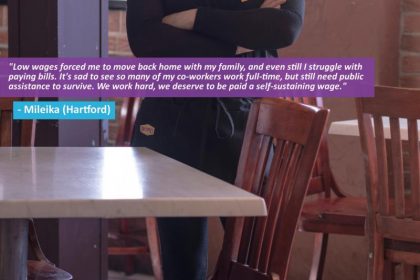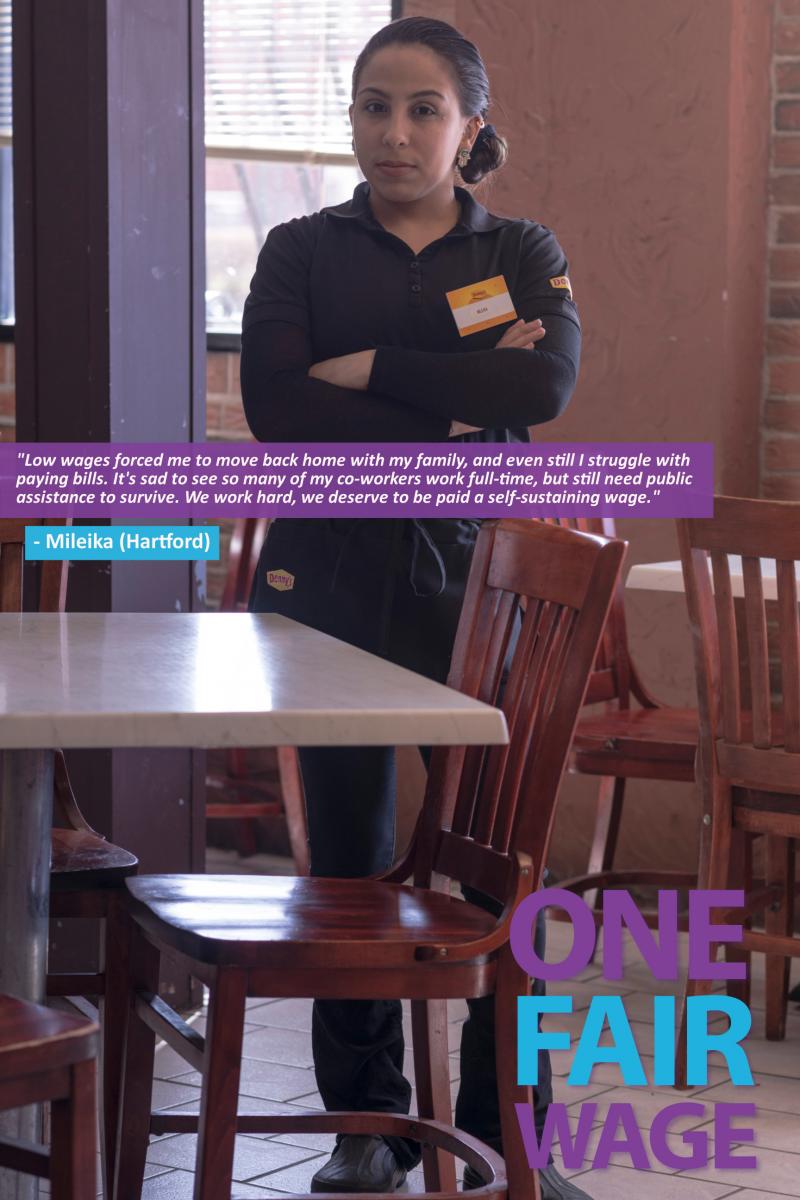
I have been a server at Denny’s for 7 years and never once questioned why my managers or customers were able to talk to and treat me the way that they do. I never questioned why I was paid less than minimum wage or how my paychecks came out to be so little at the end of every pay period. I struggle every week to manage my cash tips because that is all I will have to pay my bills, my rent, and budget for my life. When you’re in that situation, you don’t know there is a different way until someone shakes you and wakes you up. Now I know, being paid a sub minimum wage is not okay and if I can barely sustain myself on $5.78 an hour—I live at home, go to school full time, and don’t have any children to support—how do the other women around me with families and more responsibilities have any chance of supporting themselves on tips?
 I have been working with Restaurant Opportunities Centers (ROC) United in CT for a few months now. I was a part of a photo series detailing the effects of the sub minimum wage on tipped workers; I have been to the Capitol and spoken to legislators about this issue and my experience; I have written letters to the editor; I have spoken to my coworkers about the difficulties we face every day on the job. It was only after coming to the New England Food Summit and watching the documentary “The Hand That Feeds” with the other members of the Food Chain Workers delegation that I began to realize how powerful workers can be. We are the backbone of the service industry. We are the ones who grow, pick, package, ship, prepare, and serve the food. We drive this industry. So why, if we contribute so much to making this industry as profitable as it is, do we get so small a slice of the pie? It’s because the National Restaurant Association—the people who employ us—works so hard to keep us down. The scales are tipped so heavily in the favor of those already in power—through legislated forms of discrimination and a widening socio-economic gap—that most people working in food service never even dream of change let alone know how to make it happen.
I have been working with Restaurant Opportunities Centers (ROC) United in CT for a few months now. I was a part of a photo series detailing the effects of the sub minimum wage on tipped workers; I have been to the Capitol and spoken to legislators about this issue and my experience; I have written letters to the editor; I have spoken to my coworkers about the difficulties we face every day on the job. It was only after coming to the New England Food Summit and watching the documentary “The Hand That Feeds” with the other members of the Food Chain Workers delegation that I began to realize how powerful workers can be. We are the backbone of the service industry. We are the ones who grow, pick, package, ship, prepare, and serve the food. We drive this industry. So why, if we contribute so much to making this industry as profitable as it is, do we get so small a slice of the pie? It’s because the National Restaurant Association—the people who employ us—works so hard to keep us down. The scales are tipped so heavily in the favor of those already in power—through legislated forms of discrimination and a widening socio-economic gap—that most people working in food service never even dream of change let alone know how to make it happen.
Coming to the 2015 New England Food Summit, meeting the people working to make their states’ food systems better, and seeing all of the research and programs that back up the fight for a fair labor system gave me hope; I realized that this movement goes way beyond me, or the organizer from ROC who brought me to the Summit, or even beyond ROC and its many fights. My concerns and my experiences were echoed in the other members of the Food Chain Workers delegation and it gave me hope. Even when, while at the Summit, my boss texted me an intimidating message for taking off the days to be in Boston, I was not afraid because I knew that I could call on anyone in the room during those two days to stand behind me.
On June 23rd, the Food Chain Workers Delegation attended a legislative briefing at the Massachusetts State House in Boston to talk about proposed legislation to raise the wage for tipped workers in MA and end the two tiered wage system. I look forward to seeing my new friends and allies from the Summit in the fight for One Fair Wage.
Mileika Arroyo was a member of the first ever Food Chain Workers Delegation to the 2015 New England Food Summit. Mileika is a member of Restaurant Opportunities Centers (ROC) United in Connecticut and a server at Denny’s.




